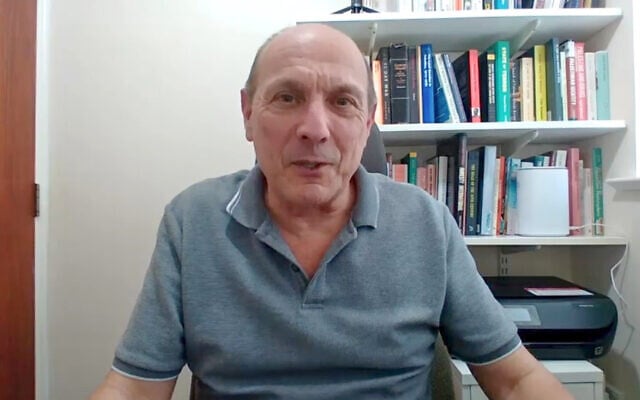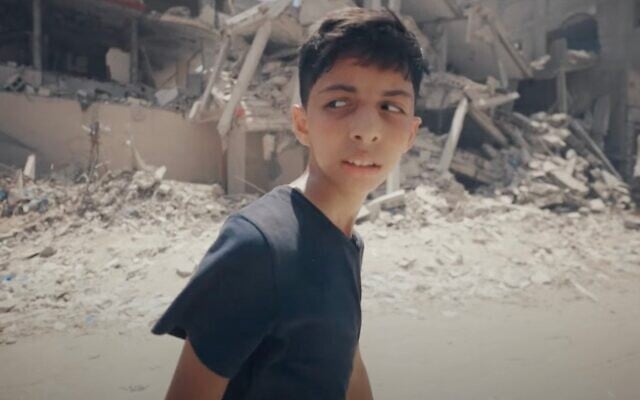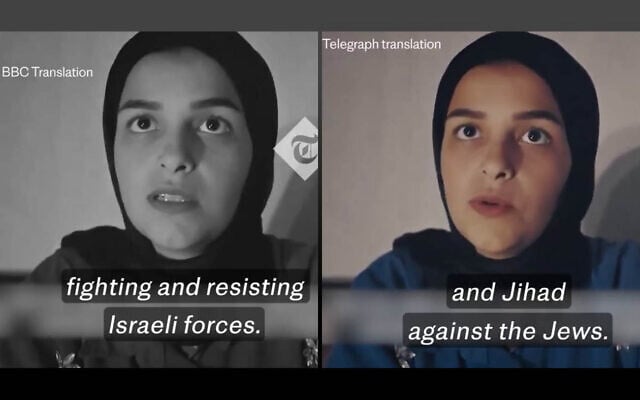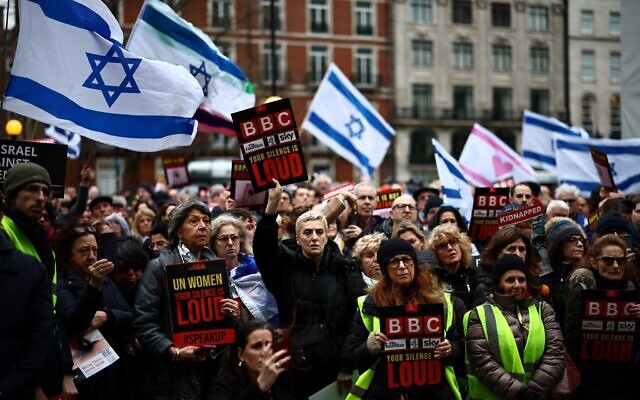
This screenshot from the trailer for ‘Gaza: How to Survive A War Zone’ shows narrator Abdullah Al-Yazouri, whose father is a Hamas deputy minister. (YouTube screenshot; used in accordance with article 27a of the Copyright Law)
THE TIMES OF ISRAEL | Published March 8, 2025
David Collier, who swiftly revealed the film’s narrator to be ‘Hamas royalty,’ believes the episode could be a turning point for an outlet perennially accused of anti-Israel bias
It took investigative journalist David Collier exactly five hours to find out that Abdullah, the narrator and main subject of the BBC documentary “Gaza: How to Survive a Warzone,” was the son of a high-ranking Hamas official.
Collier’s discovery has led to the film’s removal from streaming and ignited a very public crisis at the media outlet, long regarded as the gold standard for international journalism.
Now, longstanding accusations of the BBC’s anti-Israel bias have once again come to the fore in light of Collier’s work.
“I’m just one guy with a computer in north London,” says Collier in an interview with The Times of Israel, pointing out that despite its vast, taxpayer-funded resources, the broadcasting giant didn’t manage to do its due diligence.
Getting to the truth behind the documentary — which follows several children in Gaza over a period of months — was not entirely without risk, says Collier.
“I did a deep dive with Google, but software doesn’t like it when you reverse image children — and rightly so,” he says.
Nonetheless, it took Collier just hours to find out that Abdullah’s father is Dr. Ayman Al-Yazouri, a Hamas deputy agriculture minister.
Production company Hoyo Films and the BBC omitted this, along with the fact that one girl in the film is the daughter of a Gaza police captain who Collier describes as a “Hamas enforcer.” Another child brandished an AK-47 assault rifle while posing next to a Hamas terrorist, while the documentary’s two cameramen displayed a clear anti-Israel bias on their social media accounts.
Investigative journalist David Collier in his study in London during a Zoom interview with The Times of Israel, March 2025. (Screenshot)
Anti-terror police are investigating whether money paid by Hoyo Films to Abdullah’s family ended up with Hamas, which the British government has designated as a terrorist organization. The documentary cost £400,000 ($515,000) to produce, and the BBC is entirely funded by taxpayers.
The broadcasting company has apologized profusely in an unprecedented statement, with chairman Samir Shah calling the affair “a really, really bad moment” and “a dagger to the heart of the BBC claim to be impartial and trustworthy.”
Collier believes this may be a watershed moment for the BBC.
“I immediately knew I had them,” he says. “Initially, they defended themselves by maintaining that it is impossible to check the background of everybody in Gaza who might feature in their reporting, but that’s ridiculous.”
He’s convinced the BBC didn’t attempt to look into the background of the subjects and could have found out the truth just as easily as he did: “I’m just a troublemaker with a keyboard.”
This, Collier believes, reflects systemic problems inside the BBC.
“They try to appear neutral by equating a liberal democracy with an Islamist terror organization,” he says.
According to Collier, the BBC puts Israel and Hamas at opposite ends of a spectrum, with Palestinian civilians in the middle.
“They pretend that Hamas and the Palestinians are two completely separated entities — as if Hamas is some alien invasion power that dropped from the sky, nothing to do with Palestinians,” he says. “They do the same with Hezbollah in the south of Lebanon. Somewhere halfway between Hamas and Israel are the ‘normal’ Palestinian civilians, so all media attention is focused on them.”
This screenshot from the trailer for ‘Gaza: How to Survive A War Zone’ shows narrator Abdullah Al-Yazouri, whose father is a Hamas deputy minister. (YouTube screenshot used in accordance with article 27a of the Copyright Law)
Where does the urge to present what Collier deems to be a false equivalence between Israel and Hamas stem from? Collier looks to the demographic developments in Britain.
A screenshot showing the mistranslation of the BBC’s subtitles in the documentary ‘Gaza: How to Survive A War Zone.’ (Screenshot from X, used in accordance with Clause 27a of the Copyright Law)
The way the BBC covers Gaza is completely different from any other conflict, says Collier, pointing out that, in practical terms, the documentary makers were embedded with Hamas.
“Why is that?” he asks. “Were they embedded with Assad’s forces in the Syrian civil war? With ISIS in Iraq? With the Russians in Ukraine?”
In all these conflicts, the BBC used different standards than in Gaza. But this time, Collier says, they’ve gone too far. Still, he is not without hope things may change for the better.
“There are still a lot of good people at the BBC who will come to our rescue if they know,” he says. “Some people in the UK say, ‘Just defund the BBC.’ I say, ‘Lower your expectations. Get to a situation where they no longer mark their own homework.’”
Protesters hold placards and wave Israeli flags as they take part in a demonstration outside the BBC headquarters in London, on February 4, 2024, to bring attention to the plight of kidnapped Israeli women in Gaza. (Henry Nicholls / AFP)
Collier thinks it’s vital to keep the pressure on the BBC now. The affair even came up as a question when British Prime Minister Keir Starmer visited US President Donald Trump in the White House.
“You can’t say this was a blip and we can go back to business as usual,” Collier says. “There were too many catastrophic parts of the decision-making process. I couldn’t have scripted this better, I actually caught them in bed with Hamas.”
Even some of the most outspoken anti-Israel activists who spoke up for the BBC when the scandal first broke are falling silent, he says. Five hundred media figures called on the BBC to not pull the documentary, among them lauded filmmakers like Ken Loach and Mike Leigh, and soccer star turned sportscaster Gary Lineker.
Collier visibly enjoys their newfound silence: “What fools they made of themselves.”






Be the first to comment